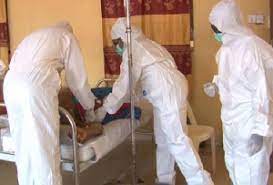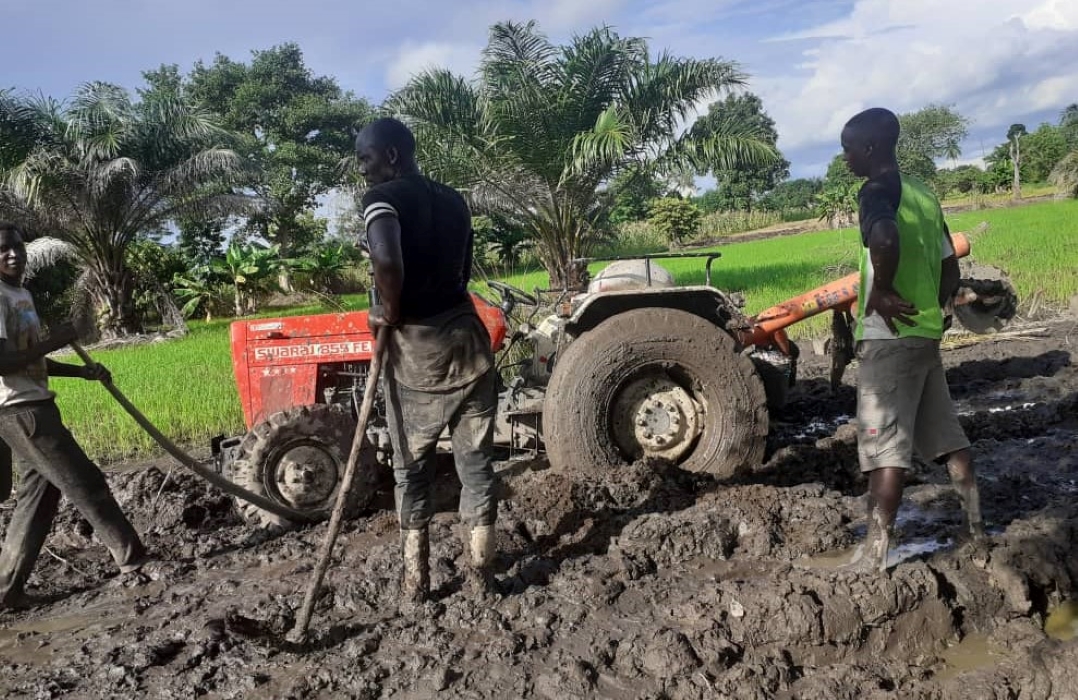Health
Agony of 46-year-old Woman Living With Irreparable VVF , RVF

Zuwaira Iliya, 46, sits quietly on her hospital bed with catheter showing from the side of her
wrapper as she slowly narrates her 30 years of struggle, living with continuous leakage of urine and faeces.
Iliya of Makarfi Village in Makarfi Local Government Area of Kaduna State has been grappling with Obstetric
Fistula but has kept hope alive in spite of what appears to be a hopeless situation.
She told a correspondent who was at the Vesico Vaginal Fistula (VVF) Unit of
Gambo Sawaba General Hospital, Zaria in Kaduna State, on a special interview to mark the 2023 International
Day to End Obstetric Fistula (IDEOF) that she would be healed against all odds.
She had lived with VVF and Rectovaginal Fistula (RVF) for 30 years, as she contracted the
condition at the age of 16 after her marriage.
Iliya said that she became pregnant soon after her marriage but experienced prolonged labour during childbirth,
adding that she lost the baby and also developed both VVF and RVF in the process.
VVF or Obstetric Fistula, also known as fistula, is a childbirth complication which leads to abnormal opening between
the bladder and the vagina, causing continuous and unremitting urinary incontinence.
The condition is among the most distressing complications of gynecologic and obstetric procedures which can
cause discomfort, and if left untreated, it may lead to serious bacterial infection, which may result to sepsis, a
dangerous condition that can lead to low blood pressure, organ damage or even death.
Similarly, RVF is a communication between bladder and rectum, where faeces pass before getting to the anus, leading
to intermittent leakage of faeces into the vagina.
The development of these conditions, therefore, plunged the young Iliya into a life of agony, and for the past 30 years,
she said she had been struggling with depression, rejection, ridicule and abandonment.
She said “I was married off at the age 16, and immediately became pregnant. When it was time to deliver the baby,
I went into labour for three days.
“I was taken to the hospital for delivery but had a big cut to enable the baby to come out and that was how I developed
VVF and RVF.
“Thereafter, I was taken to a hospital in Kano, where I underwent surgery three times without success. And from
there, I was taken to another hospital in Jos, Plateau State but instead of performing a surgery, the doctor referred
me to this VVF Unit in Zaria.
“Here in Zaria, I was operated twice but still I continue to leak urine and faeces. Notwithstanding, I am still hopeful
that maybe, just maybe if I undergo another surgery, I will be healed.”
Describing her life as “a very sad one”, Iliya said that her husband divorced her in Kano because of the condition
and she returned to her parents’ house.
She added that while trying to get better when her parents took her to the hospital, her mother and father died, leaving her all alone.
She explained that “my life is a life of agony because I was with my mother here in the hospital when she became ill and died,
four days after my second surgery. I went to her burial with this catheter on me.
“And just when I was waiting for another surgery, I received a message that my father was ill. I left the hospital to look after him
and he also died.”
However, in spite of the visibly hopeless situation, relentless Iliya said she would not give up, saying she hopes to get better and
one day give birth to a child.
She said “I have seen how some VVF survivors were operated on and were healed, went back home, became pregnant and
then returned to the hospital and delivered their babies through Caesarean Section (CS).
“This is why I am still hopeful that all is not lost and I have resolved to stay and get well so that maybe God will give me a child,” she said.
On her part, Hajiya Fatima Umar, the Head of the VVF Unit at the Gambo Sawaba General Hospital in Zaria, said there are
more than 20 irreparable fistula cases on the hospital list waiting for help.
Umar said some of the women have even made the hospital their homes, while others live in communities but maintain
contacts with the facility.
She added that “actually, the women have not been finding it easy staying in their environment or in their homes.
Sometimes if they come and they are examined, or if they hear that other doctors are coming from somewhere, they will come.
“If they come, the doctors will examine them. Even if the doctors say they can’t operate on them, they
will still come after a while because they are already comfortable with the hospital environment.
“They prefer to be in the hospital than their homes because nobody is rejecting them here.’’
Also, Dr Ado Zakari, the Fistula Surgeon and Consultant, Public Health Physician, said most of the irreparable
fistula cases were caused by quacks.
According to him, there is nothing doctors can do if the fistula is too wide, and the damage is extensive.
He said “there are situations where the damage becomes extensive and there is nothing we can
do because it is just the question of getting available tissue to repair.
“A situation where the entire tissue has been damaged, there is no way it can be repaired.
“This is because most quacks have no knowledge of anatomy; they operate anyhow. They take out everything,
even the bladder tissue and when you look at it, there is no way you can repair it.
“You cannot create any tissue anywhere and close the fistula. Fistula is a hole, it is a communication, and if it is so wide,
where will you get the tissue to repair it?.
“We have such cases; they are irreparable. We cannot repair them,” Zakari said.(NAN)
Health
No pending Lassa Fever Cases in kaduna—–Official

Kaduna State Primary Health Development Agency, (KPHDA) says there is no pending cases of Lassa fever in the state.
Director of public health, Ibrahim Hamza-Ikara, told the News Agency of Nigeria on Wednesday in Kaduna, that the state has not recorded any Lassa fever cases for the past few weeks.
He added that all suspected cases have been discharged from the hospitals.
“We have not recorded any Lassa fever cases for the past few weeks and all the remaining eight patients have been discharged.
He said the state would continue it’s sensitisation programme on how best to improve hygiene practices to residents.
The News Agency of Nigeria recalls that on February 23, the state recorded four deaths of Lassa fever and three on admission from the 44 Nigerian Army Reference hospital in the state.
Others infected were identified and being closely monitored.
He urged residents to maintain proper food and environmental hygiene and immediately report any suspected cases of Lassa fever to the nearest health facility for prompt attention. (NAN)
Health
BNSG Signs MoU With Shanghai Haitian hospital, Sinoki System for Training Activities

From Attah Ede Makurdi
The Benue State Government, on Monday , singed Memorandums of understandings (MOUs) with the Shanghai Haitian Hospital, to facilitate academic and clinical interchange between Benue State University Teaching Hospital, Makurdi.
The partnership according to the MoU, is in the areas of joint studies, training activities, and other educational exchanges of mutual interest.
The government has also entered into partnership with Sinoki System Limited, for the establishment of a Hybrid Solar Panel Factory in Benue State.
Signing the two Memorandums of understandings (MOUs) at the Old Banquet Hall of the Benue State Government House, Makurdi on Monday, Governor Hyacinth Alia said he was excited and optimistic that the partnerships would open many more doors of investments in the State, adding that his administration is willing to welcome more investors into the state.
He described the partnership with the Shanghai Haitian Hospital as an exciting one, saying his administration is determined to improve the overall health sector in the state, thereby discouraging the trend of health tourism to other countries.
“I am quite excited because our administration’s focus is to improve the health sector in the state that will be capable of increasing the lifespan of our people. The Benue State University Teaching Hospital as a partner in this is going to benefit from this collaboration, and it is our hope to discourage our people going overseas on medical tourism. There is nothing wrong in translating the finances spent elsewhere into our system.
“The partnership with the Shanghai Haitian Hospital will open more doors, especially as we also have Tertiary healthcare systems here in the state. Where we inherited total collapse of the healthcare system, we need to put all machinery in place to ensure that beginning from the primary to our tertiary health institutions, there are improvements.”
On the partnership with Sinoki System Company for the establishment of a Hybrid Solar Panel Factory in Benue State, the governor described it as a quick fix to the epileptic power challenge faced in the state, explaining that for every business to thrive, there must be some stability in electricity and he is excited about the partnership.
“The partnership is going to be a plus to the State. The business partnership will bring about the establishment of Hybrid Solar Panel Company in Benue State, through a Private Partnership agreement between the Benue State Government and Sinoki System Limited. We are excited about this because it will open more investment doors in the state.
“As I have mentioned at some other forums, we are a state that is open for business, and we are welcoming investors into our state to come and do business.
“The establishment of the Hybrid solar panel company in the state has come at a time when the electricity situation has been epileptic. But for business to thrive, we definitely need some stability of electricity. This is one quick fix to the anxiety and I am very excited about it,” the governor explained.
He called for more investors to take advantage of the many untapped investment opportunities in the state, promising that government on its part will continue to create the enabling environment for businesses to thrive in the state.
Earlier in his address, the Special Adviser to the Governor on International Investment, Hon. Alex Adingi, while introducing the investors, said the investors have expressed their desire to partner with the state government in the two areas of health and energy for the overall good of the state, been the reason they have come to sign the partnership agreement.
A statement by chief press secretary to Governor Alia, sir Tersoo Kula said William Wang, a Director with the Shanghai Haitian Hospital, represented the Hospital while Liu Hai Ding, represented Sinoki System Limited.
Health
Lassa Fever: NCDC Registers 1 Death, 15 New Cases in 1 Week

The Nigeria Centre for Disease Control and Prevention (NCDC) has reported one death and confirmed 15 new cases of lassa fever within one week across the country.
The NCDC said this in a situation report for week 13 published on its website on Friday.
Reports says that lassa fever is an acute viral hemorrhagic illness transmitted to humans through contact with food or household items contaminated by infected rodents or contaminated persons.
Its symptoms include fever, headache, sore throat, general body weakness, cough, nausea, vomiting, diarrhoea, muscle pains, chest pain, and, in severe cases, unexplainable bleeding from ears, eyes, nose, mouth and other body openings.
The NCDC noted a decrease in the number of confirmed cases from 25 cases in week 12 to 15 cases in the reporting week, although the number of suspected cases increased compared to the same period in 2023.
Cumulatively, from week one to 13, the country recorded 806 confirmed cases and 150 deaths, with a case fatality rate (CFR) of 18.6 per cent, higher than the CFR for the same period in 2023 (17.5 per cent).
“Twenty-five states have recorded at least one confirmed case across 125 local government areas in 2024.
“Sixty-two per cent of all confirmed cases were recorded from Ondo, Edo, and Bauchi, with Ondo State accounting for 24 per cent, Edo 22 per cent, and Bauchi 16 per cent,” it said.
According to the report, no health worker was infected in the reporting week, and individuals between the ages of 31 and 40 were predominantly affected by the infection.
The NCDC said the National Lassa Fever Multi-partner, Multi-sectoral Incident Management System had been activated to coordinate response at all levels at the Emergency Operations Centre (EOC).
The NCDC highlighted some challenges in the fight against lassa fever, including the late presentation of cases leading to increased CFR and poor health-seeking behaviour.
It attributed the latter to the high cost of treatment and clinical management of lassa fever, as well as poor environmental sanitation and awareness in high-burden communities. (NAN)



















